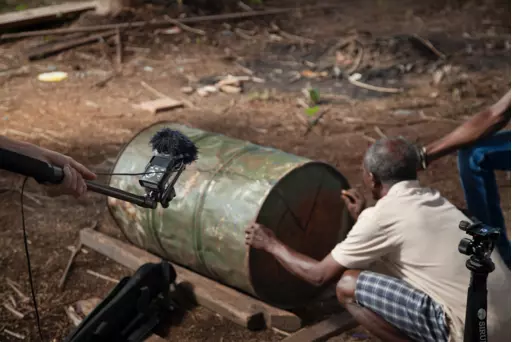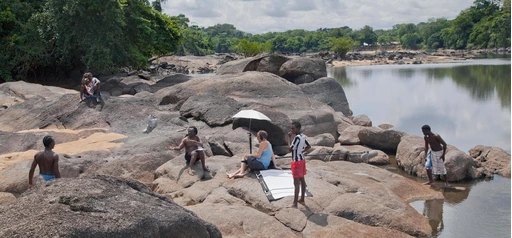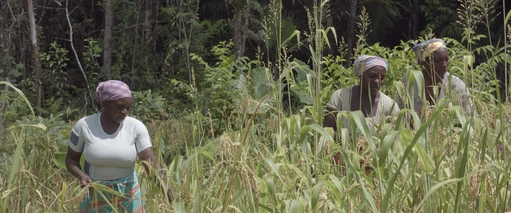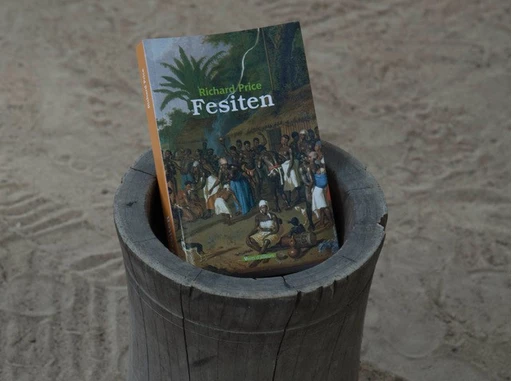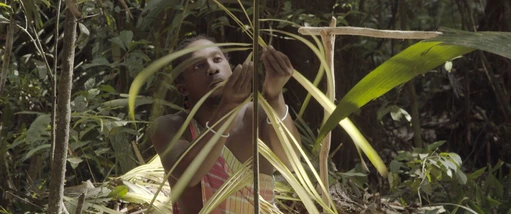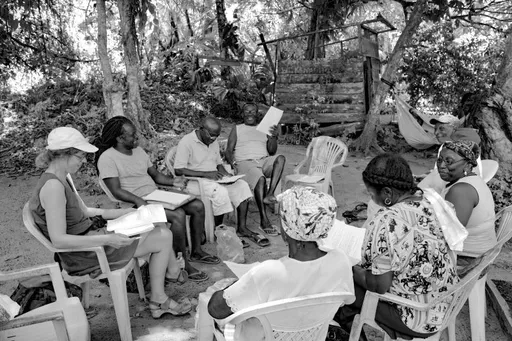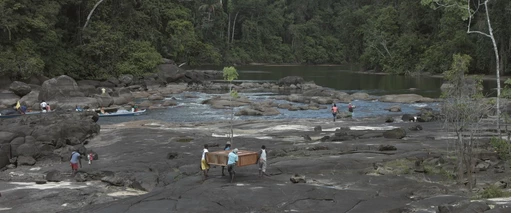
Stories from Rainforest by Lonnie van Brummelen and Siebren de Haan
part of: LAND: about climate breakdown, ownership, territory and colonialismFor this particular project, they collaborated with Surinamese Maroons, whose ancestors were abducted from Africa to Guianas three centuries ago to toil on plantations under the Dutch colonial rule. After freeing themselves from enslavement, the Maroon people built a new life in the rainforest, where they have cultivated a strong, ritualized bond with their environment. Currently, the Maroon communities are fighting against the global extraction machine that is pushed into the deep rainforest of Suriname. Departing from their lifeworld, and after long and careful considerations and exchange, Lonnie van Brummelen and Siebren de Haan invited the Maroons to engage in a cinematic exchange and collaboration. This longstanding and extensive collaboration resulted in a film with the Maroon people about their struggle for freedom and the protection of the rainforest.
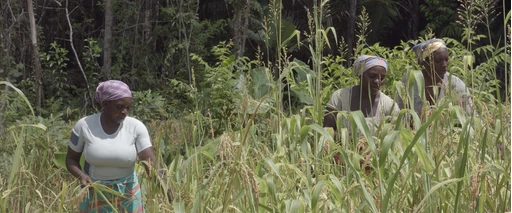
Stones Have Laws (Dee Sitonu A Weti)
In addition, we are delighted to share with you a series of essays written by Lonnie van Brummelen and Siebren de Haan, titled Stories from the Rainforest, and a special contribution by journalist and documentary maker Kevin Headley, who in his essay, gives an in-depth account of the current struggles for recognition of land rights for the Maroon and Indigenous communities in Suriname.
Recap of online conversation 'Stones Have Laws'
Filmmakers Lonnie van Brummelen, Siebren de Haan and Tolin Erwin Alexander discuss with moderator Kevin Headley how crucial it was for the film to support the land right struggle of the Maroon community. Until their land rights are recognised, the Maroon community continues to live with uncertainty, as the government displaces the Maroon communities for the extraction of natural resources such as petroleum, gold and bauxite. The film makers also spoke about how they have developed a trustful relationship with the communities involved, ensuring that this film was told in a rightful way. Lonnie van Brummelen and Siebren de Haan work together since 2002, producing film installations, writing, sculpture and collages. Tolin Erwin Alexander is a director, producer, writer and dancer in Suriname. Kevin Headley is a journalist, documentary maker and writer.
Leven in een multiversum
Mister Motley publiceerde in 2018 het interview 'Leven in een multiversum' waarin Lietje Bauwens het kunstenaarsduo Van Brummelen & de Haan spreekt over het onderzoek naar het oprekken van landsgrenzen. ArtEZ Studium Generale publiceert het interview opnieuw in het kader van het project LAND en de online filmvertoning van 'Dee Sitonu a Weti / Stones Have Laws' en het gesprek met de makers Van Brummelen & de Haan. Lonnie van Brummelen en Siebren de Haan werken sinds 2002 samen; schrijven en maken sculpturen en collages, en produceren films and installaties. Lietje Bouwens is een schrijver en onderzoeker in Brussel.
Textual appendices Stories from the Rainforest
Stories from the Rainforest: Introduction
Read here the introduction to the essay series on Stories from the Rainforest.
Stories from the Rainforest: Plantationocene
a contract with nature
Read here Plantationocene, the first essay in the series Stories from Rainforest.
Stories from the Rainforest: Nature intended it that way
Read here Nature intended that way, the second essay in the series Stories from Rainforest.
Stories from the Rainforest: Nature intended it that way 2
Read here Nature intended that way, part 2, the third essay in the series Stories from Rainforest.
Stories from the Rainforest: The dance of relating
Read here The dance of relating, the fourth and final essay in the series Stories from Rainforest.
The fight for acknowledgment of human and land rights in Suriname
The Fight for Acknowledgment of Human and Land Rights in Suriname
As quoted in this essay by Kevin Headley: "The land rights are the greatest security that the Surinamese government can give to the original inhabitants of this country," says Theo Jubithana, chairman of the Association of Indigenous Village Chiefs in Suriname, VIDS. "As long as it is not recognized by law, we will continue to live in great uncertainty every day.” While there are agreements in place regarding the areas inhabited and used by the communities, the state of Suriname fails to legally corroborate their rights to the land which they live on and with.
